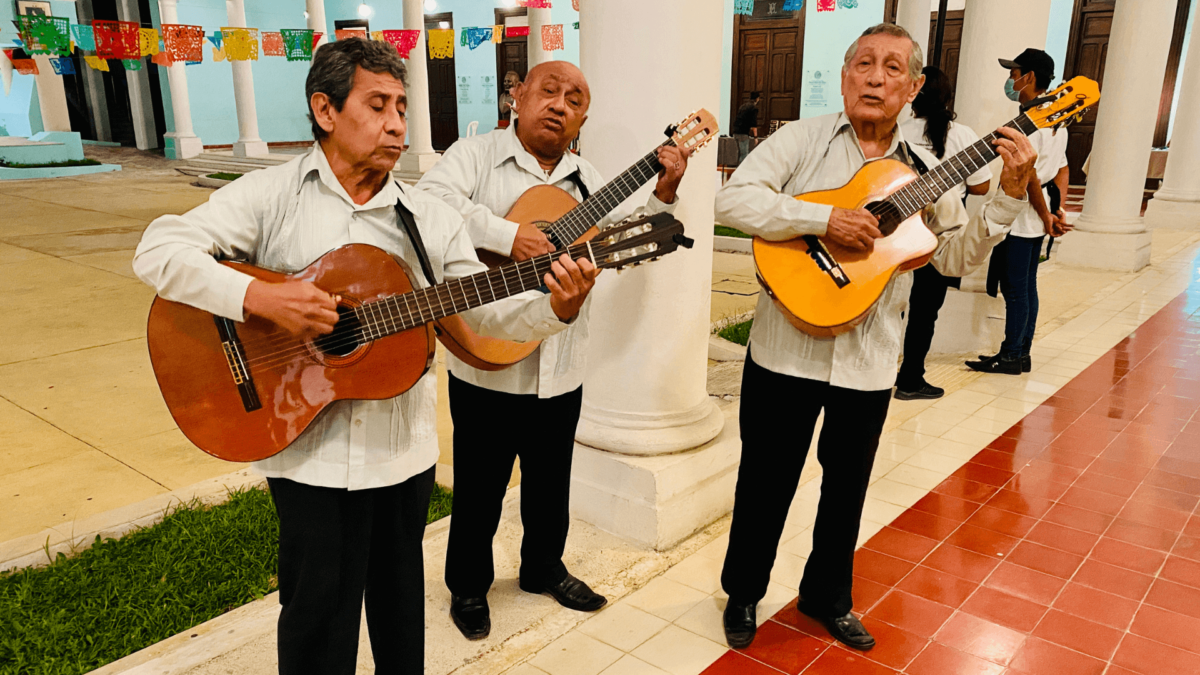Sharing is caring!
The culture in Mérida is the fusion of Latin America, European, Lebanese, Asian, African, and Indigenous cultures, all mixing during the colonial period. This mixing is known commonly as mestizaje or mestizo. Therefore, it produced a unique cultural identity which is the basis for modern-day Mérida as well as Mexico. Notably, it is seen in every aspect of life from food to clothing, from art to architecture, and from music to language.
This article was updated in August of 2023.
Architecture
Unquestionably, Mérida architecture is stunning, diverse, and full of history.
As you visit the city and surrounding areas, you can see:
- Ruins of ancient pyramids
- Baroque Churches
- Neo-classical buildings
- Modern high-rise apartments
- Art deco homes
- Gorgeous pastel-colored colonial style homes
Days of Celebration
Mexico’s Independence Day is not on May 5th, but rather on September 16th. Celebrations begin on the eve of the holiday with fireworks, music, and dancing. The next day, parades take place in most neighborhoods.
The most popular food in the culture in Mérida for this celebration is Chiles en Nogada: meat stuffed chili peppers topped with a creamy sauce and pomegranate seeds.
Another important celebration is Day of the Dead. A commemoration of death and a celebration of life, celebrations occur on November 1st and 2nd. People create colorful shrines or ofrendas to honor the deceased. Placed in homes, offices, churches, schools, and squares in the weeks prior to the holiday, you’ll see them everywhere. Lit with candles, graveyards are another popular spot for ofrendas.
Spending time with friends and families during holidays is an integral part of Mexican culture. Many people take time off during Semana Santa or Easter week. Additionally, the Christmas season begins December 16th with Posadas. These get-togethers symbolize the journey to Bethlehem before the birth of Jesus. You’ll find a variety of posadas with some saying prayers and eating fruits with others drinking, eating, dancing, and, of course, breaking Piñatas. January 6th marks the end of the season with the celebration of Three Kings Day, a holiday where the Three Wise Men traditionally bring gifts to children.
Music
Different styles of music offer culture in Mérida as well, such as reggaetón, cumbia, bachata, and salsa. The traditional music of Mérida is Mariachi and Trova. Trova first emerged as a music genre in Santiago, Cuba at the end of the nineteenth century, the result of the constant musical exchange between Yucatán and Cuba. Another heavy Cuban influence in the culture of Mérida is the guayabera shirt. You’ll see many men wearing these beautiful shirts adorned with 2 or 4 pockets and vertical rows of delicately sewn pleats.
Etiquette in Mérida
Because Mérida is a conservative city, it is also formal. Therefore, etiquette in the culture in Mérida is very important.
General Etiquette
Be specific: be very specific with what you need and make no assumptions. If you ask for a glass of water, be sure you ask for natural water with (or without) ice. This culture does not assume anything. Therefore, it is your responsibility to ask for exactly what you need down to the smallest of details to avoid frustration on both sides.
Mañana: The word mañana means many things including morning, tomorrow, and never.
At times, mañana is a polite way of saying no. It is considered rude to tell someone no (thus saying mañana).
Elderly: Show heightened respect to those that are noticeably older. Let them pass when in public. On buses, allow them to take your seat if the others are full.
Dating: If someone of the opposite gender invites you to dinner, it is usually interpreted as a possible romantic gesture. Ask a friend to join you to reduce the chances of a misunderstanding. If you are a man, you might be expected to pay for the meal.
Restaurant & Food Etiquette
Restaurants: You’ll have to ask for your check when at a restaurant as Mexican servers think it is rude to rush you or bring your check to you. Additionally, you can sit and enjoy your conversation and companionship as long as you like. Just tip your waiter/waitress accordingly.
Eating: Be aware of the spiciness of the food. If you do not have a good tolerance for spicy food, tell your Mexican counterpart or restaurant server. Many meals are made up of multiple components that have varying degrees of spicy heat.
Meals: Meals can last quite a long time, especially if there are multiple dishes and servings. Mexicans prefer to socialize over meals, and do not like to be rushed when eating.
Communication Etiquette
Communication: when sending messages, it is polite to start with a greeting. Most locals will wait for your response and then tell you what they want and vice versa.
Greetings: It is normal for strangers on the street to tell you buenos dias (good morning), buenas tardes (good afternoon), or buenas noches (good evening). Etiquette is to respond in kind or to offer the greeting first. Always say goodbye to someone before leaving, especially at a gathering or dinner. Leaving without doing so can imply that you did not enjoy the gathering or their company.






